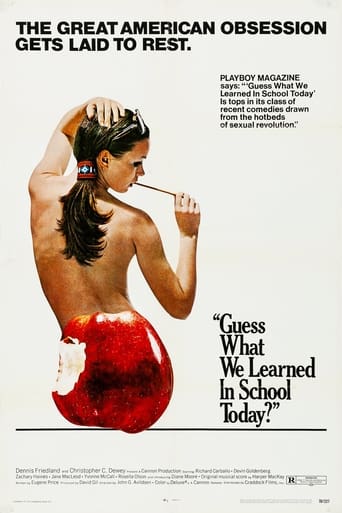Michael Ledo
This is a campy film about how sex education was viewed as a communist plot. The film had dated gags and political incorrectness. There is a scene where a man in the shower asks his wife to toss him the shampoo. She picks up the Prell and tosses it in the shower as we hear glass break. The Prell ads of the era showed that Prell came in a plastic container and could be tossed without breaking, one of the first shampoos to use a plastic container as opposed to glass. I would think half the population would miss that one. They also ate "Uncle Tom's Pancakes." Ouch!The film simply isn't that funny anymore. It includes many 1 credit actors.Guide: F-bomb...maybe 2. Nudity (Jane McLeod, Rosella Olsen, Dianne Moore, Sandra Wolfe + others)
Woodyanders
The uptight grown-ups in a stuffy small town try to prevent their kids from receiving a proper education on sex. That's about it for the admittedly flimsy plot, but fortunately director John G. Avidsen keeps the pace moving along at a brisk clip and maintains an amiably inane'n'irreverent tone throughout. Meanwhile, the disjointed narrative structure and occasional breaking of the fourth wall give this screwball outing an engaging "what the hell?" experimental countercultural bent that's very indicative of the sunny carefree innocent vibe of the early 1970's. Eugene Price's breezy off the wall script happily pokes fun at puritanical middle class sexual mores and conservative small town values in a pleasant and good-natured way. Granted, the characters are broadly drawn caricatures and the satire is decidedly less than subtle, but overall it's just too bubbly and goofy to dislike. Moreover, it's acted with zest by a lively cast, with especially energetic contributions from Zachary Hains as gung-ho military freak Lance Battle, June McLeod as Battle's frustrated wife Rita, Dick Carballo as killjoy vice cop Lt. Roger Manley, Yvonne McCall as chipper sex ed teacher Dr. Lilly Whitehorn, Rosella Olsen as the daffy Eve, Diane Moore as attractive spunky blonde Lydia, and Iris Brooks as the brash Lulu. Of course, the generous sprinkling of yummy female nudity certainly doesn't hurt matters any. Good zany fun.
tavm
Just watched on YouTube this rarity from one John G. Avildsen before his fame from Joe, Save the Tiger, Rocky, and the Karate Kid movies. This is a comedy about the Generation Gap and the ridiculous reactions among the middle agers of sex education for young kids being some kind of Communist plot. Rita and Lance Battle (Jane McLeod and Zachary Hains) are the parents of a teenage boy, Robbie (Devin Goldenberg), who happens to have a crush on his babysitter, Lydia (Diane Moore). Their neighbors are police Lt. Roger and Eve Manley (Dick Carballo and Rosella Olsen). Both Roger and Lance are against a psychiatrist, a Dr. Lily Whitehorn (Yvonne McCall), teaching sex education at her school for underage kids. It should be noted that both men have hangups as Lance can't bed his wife and Roger seems to be bi as evidenced by his relationship with female dresser Billie (Stanton Edgehill). I'll stop there and just say that the whole thing has a jump cut structure meant to emphasize some jokes that mostly don't work but is fascinating to watch. The discussions of Dr. Whitehorn with various students about sex and certain words are perhaps the most compellingly naturalistic dialogue of the entire thing that one gets the feeling that that was improvised while the other scripted parts seem obviously contrived. And then there are some stupid characterizations like that of a stuttering mailman (Jan Saint) who likes looking at "dirty" pictures or the aforementioned husbands. I did, however, like the nude bodies of the blondes, Ms. Olsen and Moore with the redhead Ms. McLeod not looking so bad, either. In summation, Guess What We Learned in School Today? gets some points in conception but almost nothing in execution. P.S. The little girl voicing the opening credits is the director's daughter, Katherine, and if I didn't read the cast list on IMDb, I wouldn't have recognized the first radio voice as that of Bret Morrison who I knew played Lamont Cranston/The Shadow on the old radio program, "The Shadow". Oh, and he's also a native of the same city I was born in, Chicago, Ill.
The Hoyk
John G. Avildsen, before becoming the respectable director of uplifting "climb to victory" tales like ROCKY and 8 SECONDS, made this scattershot counterculture comedy about sex and suburbia. Like many movies of this period, including Brian DePalma's GREETINGS and Aram Avakian's END OF THE ROAD, the movie clumsily copies the jump-cutting, "fourth wall" breaking, and blackout staging of Jean-Luc Godard's inflential films previous to this, which may have seemed daring but serves now only to alienate the initial viewer of today. While there is the hint of a plot -- a community's resistence to sex education -- ultimately this is a clothesline to hang running gags: a too-vigilant vice cop, a suburban mom who talks in TV commercial jargon, a sheltered teen attracted to his babysitter, etc. Some gags are effective, others tedious. What does hold up in this movie is the actual sex education advice provided by the would-be visiting educator. It is honest, direct, and still relevant today. It stands out amid the ham-handed comedy antics. However, the message loses some effectiveness among the easy stereotyping of the middle-aged "squares." One cannot ask everything to be written as dryly and facutal as the average ABC Afterschool Special, but a little more realism and a little less condescending caricature would have given this the kind of longetivity that would make it better known, instead of the curious video obscurity it is now. Recommended primarily to those either nostalgic or curious about the early '70's.
